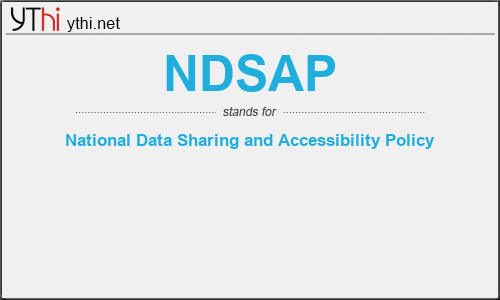What does NDSAP mean? What is the full form of NDSAP?
The full form of NDSAP is National Data Sharing and Accessibility Policy
The Union Cabinet approved the National Data Sharing and Accessibility Policy (NDSAP) on 9 February 2012. The objective of the policy is to facilitate access to Government of India owned shareable data and information in both human readable and machine readable forms.
NDSAP policy comes to light as the unsatisfactory state of India’s data collection and processing system is among the many systemic deficiencies exposed by the Covid-19 pandemic.
What is the issue?
- The unsatisfactory state of India’s data collection and processing system is among the many systemic deficiencies exposed by the pandemic.
- It was highlighted by the recent upward revisions to the COVID-19 death toll in some States.
- Apart from this implicit acknowledgement of the discrepancies in the data-handling process, there are also allegations of under-reporting COVID-19 cases.
- In general, on every issue encountered during the last three months, from the migrants’s travails to the inadequate fiscal package, lack of reliable data in the public domain has hampered the search for policy alternatives.
- In the current climate, the OGD initiative could potentially have made a substantial difference to India’s COVID-19 response.
- Had the district-wise, demographic-wise case statistics and anonymous contact traces been released in the public domain, reliable model forecasts of disease spread and targeted regional lockdown protocols could have been generated
- Principles of OGD notwithstanding, sufficiently granular infection data are not available.
- Ironically, violating the data format guidelines, OGD portal provides COVID-19 data only as a graphic image unsuitable for any analysis.
NDSAP
means
National Data Sharing and Accessibility Policy![]()
Translate National Data Sharing and Accessibility Policy to other language.
Select another language: Go
Do you want to know What does NDSAP mean? What is the full form of NDSAP?. Are you looking for What does NDSAP mean? What is the full form of NDSAP? What is NDSAP stand for? On this page, We talk about the various possible acronym, abbreviation, full form or slang term of NDSAP. The Full Form of NDSAP is National Data Sharing and Accessibility Policy
You also might want to know: how to pronounce NDSAP,
how to pronounce National Data Sharing and Accessibility Policy,
Still can't find the acronym definition for NDSAP? Please use our site search to look for more acronyms.
Showing the full form of NDSAP: 'National Data Sharing and Accessibility Policy' on your site.


Leave a Reply
You must be logged in to post a comment.